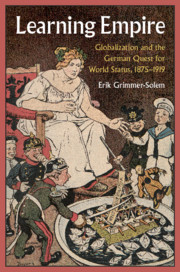Book contents
- Learning Empire
- Learning Empire
- Copyright page
- Contents
- Illustrations
- Acknowledgments
- Abbreviations
- Introduction
- Part I Absent-Minded Empire, 1875–1897
- Part II Empire Imagined, 1897–1907
- 4 World Policy
- 5 The High Seas Fleet and Power Politics
- 6 National Efficiency and the New Mercantilism
- 7 Formal and Informal Empire
- 8 Empire in Crisis
- Part III Empire Lost, 1908–1919
- Epilogue
- Selected Bibliography
- Index
5 - The High Seas Fleet and Power Politics
from Part II - Empire Imagined, 1897–1907
Published online by Cambridge University Press: 20 September 2019
- Learning Empire
- Learning Empire
- Copyright page
- Contents
- Illustrations
- Acknowledgments
- Abbreviations
- Introduction
- Part I Absent-Minded Empire, 1875–1897
- Part II Empire Imagined, 1897–1907
- 4 World Policy
- 5 The High Seas Fleet and Power Politics
- 6 National Efficiency and the New Mercantilism
- 7 Formal and Informal Empire
- 8 Empire in Crisis
- Part III Empire Lost, 1908–1919
- Epilogue
- Selected Bibliography
- Index
Summary
Germany's naval leap in 1898 concided with the start of the Spanish-American War, revealing the limits of Germany’s diplomatic pull with its still tiny navy. Likewise, tensions with the Americans and British over Samoa demonstrated German weakness in the face of an increasingly aggressive United States aided and appeased by Great Britain. This chapter analyzes these developments, as well as the outbreak of the Boer War, during which the Royal Navy violated German neutral rights by abusing its command of the sea. These developments were important catalysts for naval enthusiasm in Germany, which Schmoller, von Halle, Schumacher, Sering and the other so-called fleet professors helped mobilize during the campaign for the second navy bill in 1899 and 1900. This activity centered on the Free Union for Naval Lectures which organized pro-naval speeches throughout Germany. Likewise, the Germany Navy League, which these men helped transform into a more populist mass organization, grew in size dramatically. This culminated in passage of the second navy bill in June 1900 and in Bernhard Bülow’s appointment as chancellor.
Keywords
- Type
- Chapter
- Information
- Learning EmpireGlobalization and the German Quest for World Status, 1875–1919, pp. 213 - 249Publisher: Cambridge University PressPrint publication year: 2019

